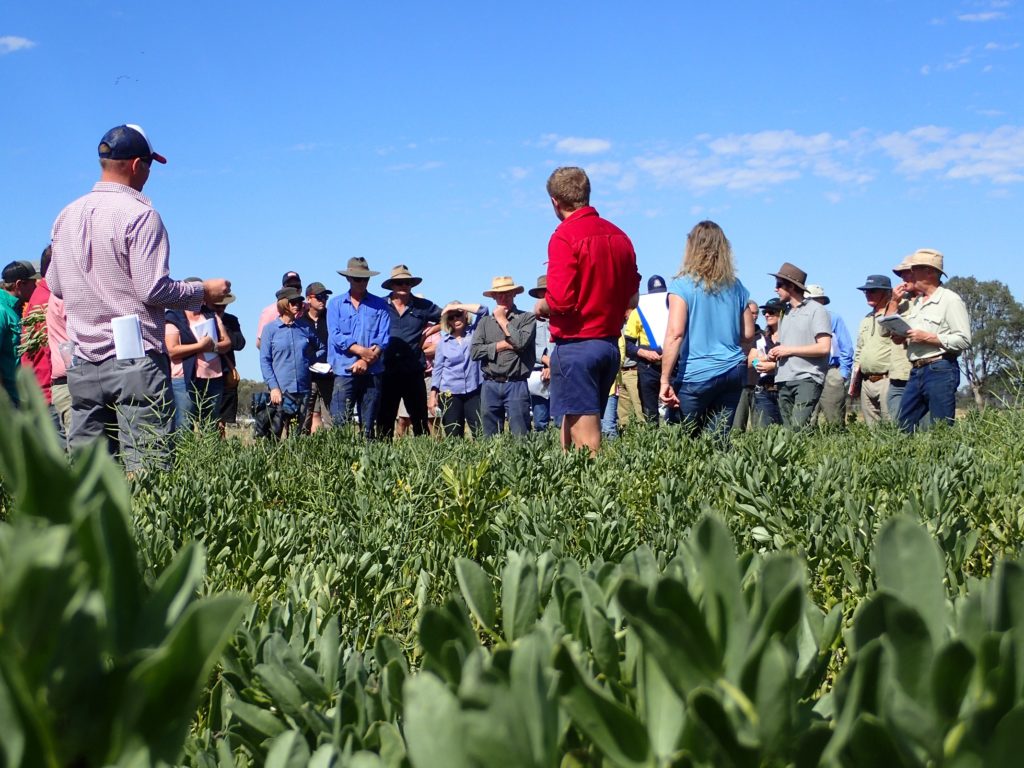Foundation for Rural & Regional Renewal (FRRR)
Upper North Farming Systems’ (UNSF’s) mission is to facilitate capacity building and empowerment of the agricultural community across the upper north region of South Australia. The group focuses on adapting and connecting farmers so they can learn from each other and from their shared experiences, and not farm in isolation. They do this by bringing farmers together in what they call Hubs. It’s a large and diverse geographical area, encompassing Booleroo Centre, Crystal Brook, Hallet, Jamestown, Laura, Peterborough, Nelshaby, Orroroo, Quorn and Wilmington. It’s a harsh climate, and when times are tough, they are very tough. The region has experienced significant declines in population and services over the past 30 years and the social fabric of communities in many areas has become frayed.

With the majority of communities in the region still reliant on agriculture, the social toll of the latest drought – the longest dry on record in 2020/21 – was evident, with symptoms of volunteer burn-out, self-isolation and mental health related issues.
Farmers know technology is essential, and farming systems have evolved significantly since the previous major drought, with stubble retention, improved efficiency of water use and a better understanding of livestock nutrition.
These communities are adaptable, open to innovation and aided through programs that promote not only professional connection, but also social and community connections, especially as these areas are typically not well-serviced by government research bodies and private consultants.
There are currently 11 Hubs under UNFS – eight geographical Hubs: Booleroo / Appila, Morchard / Orroroo / Pekina / Black Rock, Melrose, Gladstone / Laura, Jamestown, Nelshaby, Quorn and Wilmington and three non-geographic Hubs: Ladies on the Land, New Farmers and the Ag Tech Hub. The establishment of the Hubs in 2019 recognised the need to retain networks within the group and foster the tackling of issues on a smaller scale, as well as the importance of coming together on a social level.
A $20,000 Networks to Build Drought Resilience grant enabled UNFS to deliver the ‘Tools, Tech and Transformation’ workshop for farmers and agribusinesses. The key event was followed by a series of nine Hub events to provide the opportunity for networking, info-sharing, and learning about new farming systems and techniques to improve drought resilience. A ‘farmer-to-farmer’ learning model was recognised as a valuable and efficient mechanism to improve the productivity, profitability and sustainability of the agricultural industry in low rainfall zones.
“Through the Tools, Technology and Transformation event series, farmers and landholders have been provided with an abundance of information that can be adapted and changed on farm. Therefore, these tools that have been taken from the events can help farmers change their way of thinking and help their preparedness for drought or any other climate challenges they may face.”
The project reached 205 participants across 10 events that spanned six sector networks (Farm Business, Research Institute, NFP’s / Community Organisations, Consultants, Off Farm Business, Government Agency). Targeting farmers and agri-business directly, attendees learnt about tools aimed at improving efficiencies, sustainability and outcomes of operations like automatic feeding, as well as technology evolutions and business systems like satellite imagery on the farm scale, and succession and transition planning. Importantly, the solutions offered were all commercially available to be adopted on-farm, and farmers were able to speak directly with professionals in the fields, with discussions encouraged. They left with up-to-date knowledge to help them build more resilient farming systems.
The Hub events ensured accessibility for farmers who couldn’t afford too much time away from their land. They were able to talk with neighbours and researchers about the outcomes of the 2021 season and what they might be able to do better next time. Questions like when and how to de-stock, how to ensure you’re looking after genetics and bloodlines, and considerations around agisting, planting times, and upgrading tech vs repairing machinery were raised. Each Hub session included a training session in a tool, tech or system (identified from the key event by their elected Hub Representative), as well as a planning session identifying how to implement the new skills and knowledge on-farm, and where they require additional support.
Through the project, participants built knowledge and understanding of the risks posed by drought and climate change and learnt new concepts on a range of topics that can be adapted for drought and climate preparedness.
Communities had the opportunity to connect, train, converse (something many would not normally do in their usual day-to-day business) and lean on systems and each other so they are more prepared for future challenges.
For many remote, rural and regional communities, drought has been impacting families and businesses for years. Even though it is not always covered in mainstream news, those living in certain parts of Australia know all too well what lasting effects drought can have. For many working in the agriculture industry, the thought of current and future drought can be a stressful and frightening prospect with crops and livestock often hit the hardest. However, in each of these communities there is a fighting spirit, often driven by community-led groups and not-for-profits (NFPs) that work hard to support the wider community.

One of these groups is the Gippsland Agricultural Group who are driven by achieving results for farmers in the south east region of Gippsland in Victoria. The organisation is made up of Central and East Gippsland farmers and service providers that have joined forces as people with the shared desire to improve productivity, profitability and sustainability using research, collaboration, product trails and demonstrations to communities in the area.
One example of how Gippsland Agricultural Group planned to achieve this was by holding multiple field days. The Gippsland ‘Connect and Prepare’ field days were designed to build a sense of place and connection for farmers. Research conducted shows that farmers are most comfortable learning from other farmers in informal settings such walking around a paddock talking or learning while doing. For Gippsland Agricultural Group, providing resources like easy access to agricultural service providers, mental health and financial support, as well as strategies and tactics and practical learning, are all key to strengthening preparedness and resilience to future drought events.
Using a $42,920 grant through the Australian Government’s Future Drought Fund Networks to Build Drought Resilience program, Gippsland Agricultural Group held two farmer field days. Both days focused on farmer mental health and wellbeing by bringing health service providers to an environment where farmers are comfortable and feel they will be more likely to engage with services. Each day also featured key staff from other agricultural networks to encourage relationship development, project collaboration and sharing of ideas and resources. The first field day targeted producers, with a focus on networking and connecting with one another and relevant agriculture service providers.
While the field days are a great way to network and increase social interaction, the key purpose of the events is to build knowledge and skills with the estimated 200 producers, 15 agricultural agencies and service providers, and eight agricultural produce-led focus groups.
These events increased participant knowledge and understanding of the risks posed by drought by offering a program that shared information on climate variability. The events carried positive messaging about the resilience of regional producers focusing on practical, implementable drought preparedness solutions for everyday mum and dad farms.
In addition to funding the field days, the grant also enabled the installation of basic toilet facilities at a site frequently used for social and professional networking events. The community now has access to a space that supports educational, social and networking activities in a safe and hygienic space.

